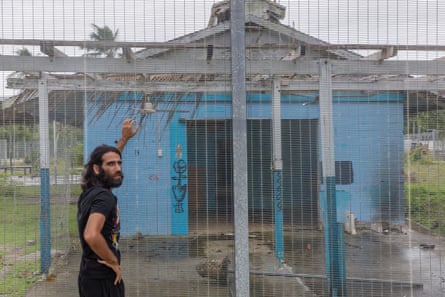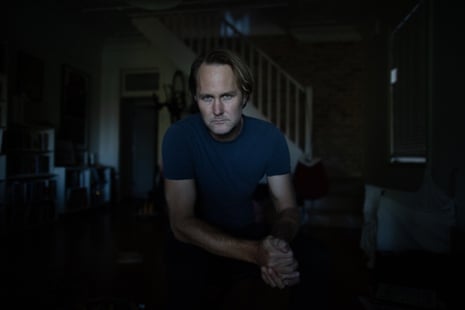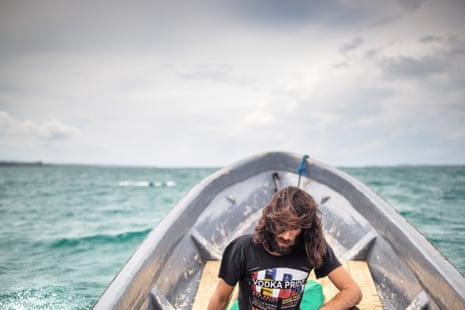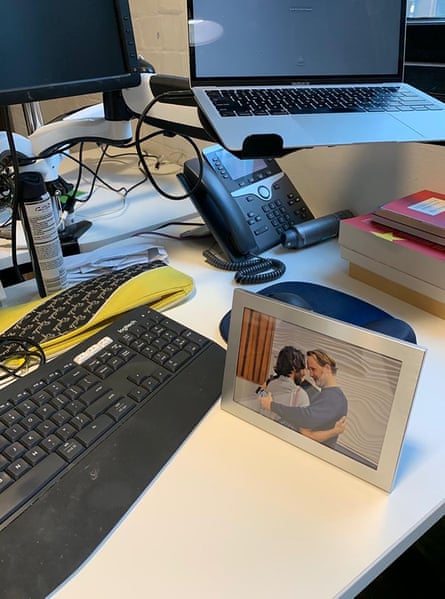[ad_1]
When Ben Doherty met Behrouz Boochani for the first time, it was the middle of the night on Manus Island.
The two journalists embraced in the darkness of the immigration detention centre.
Boochani was struck by how tall Doherty was. The Guardian Australia reporter was shocked by the refugee’s frailty, his ribs visible in the moonlight.
“I knew of the mental anguish being in those situations had but the physical impact on his body was extreme,” he says. “Behrouz was a really unwell man by the end of his detention.”

Doherty was smuggled into the newly decommissioned centre in a fishing boat during a 2017 standoff, when hundreds of refugees – fearing they would be attacked by local residents – were refusing to leave it. Water and power had been cut, people were digging wells and there was little food or medicine.
“There was a building tension something was going to break,” Doherty says. “It was confronting, being in the reality of that place.”
Now close friends, the pair first made contact in 2014, soon after Doherty was appointed Guardian Australia’s immigration correspondent.
“At that stage we had very little information about what was happening in offshore detention,” Doherty says. “These places were hugely secretive, no one could get there … we were just hearing absolutely nothing.

“So I basically did what all journalists do – start making calls and just make another call, make another call.”
That’s how Doherty obtained Boochani’s phone number – entered into his phone as “Manus contact”.
At first Boochani was wary but, slowly, trust was built.
“We built our friendship and relationship on respect,” Boochani says. “I say that as a refugee in that context. When you are a refugee, and you are a prisoner … there is a power imbalance.
“Ben treated me as a journalist … a person who told the truth. That was very important for me.”
Boochani would share small stories of procedures inside the detention centre, in text messages from a smuggled phone battling poor reception. He spoke to guards, local staff and fellow detainees, drawing on his experience as a reporter in his homeland of Kurdistan in north-western Iran.
There Boochani had suffered for speaking out. On Manus he risked the same.
The first story Boochani tipped off Doherty about was the discrimination faced by LGBTQ people inside the camp. Years later they discovered that the company paid millions by the Australian government to provide security at its offshore detention centres had hired a private investigator to find out Doherty’s source.
“I remember having discussions with the [Guardian Australia] editors that Behrouz was not a contact,” Doherty says. “Behrouz was a journalist in that place doing the work of journalism … the most courageous act of journalism I’ve seen in my lifetime.
“Someone trapped within the middle of that regime, exposing to the world how cruel that regime was … it was just incredible, and so vital, and extraordinary. I don’t think we ever would have known the reality of what happened in Manus Island without Behrouz taking the chances and risks that he did.”

In February 2016 Boochani’s first Guardian Australia article was published, headlined: This is Manus Island, my prison, my torture, my humiliation. He would remain imprisoned there for three more years.
The suffering he endured was well documented. He was frequently unwell, grew thin and twice faced the solitary confinement cells of the camp’s Chauka punishment wing.
When PNG’s police riot squad stormed the final holdout of defiant detainees in 2017, one of the first people they came for was Boochani. His phones were seized.
By then he had established a network. He felt safer.
“The world was watching us … following this story,” he says.
Continuing to write, year after year, wasn’t easy. But Boochani was driven by a sense of duty, “a mission” to lay bare the system that had entrapped him.
“It was an act of resistance,” he says. “In Kurdistan … resistance is life. When you write, when you fight, you feel you are still alive.
“The Guardian has recorded the history of this policy, the history of this tragedy.”
Doherty knew Boochani was speaking out for all the detainees on Manus.
“It was so powerful to turn immigration reportage on its head to say, well, let’s talk to the people at the centre of this, let’s talk to the people who are refugees, who are asylum seekers, who are migrants,” he says.
“Behrouz had this sense of mission, this sense of obligation … he would sometimes get frustrated with me when we couldn’t publish a story … He had to bear witness to this.”
The offshore regime has been exposed but it continues. More than 40 people remain on Nauru, more than 80 are still in PNG. Australia’s approach to asylum seekers is still one of the most punitive in the world.
But Boochani is free.
Doherty remembers waiting for Boochani at Auckland airport, hours after discovering he was receiving asylum.

“We were watching the video of the little plane coming in and waiting and waiting,” he says. “All the passengers came out and then the crew came out and then the pilots came out.
“It’s an hour after the flight and it’s 90 minutes after the flight and it’s two hours after the flight. We had this rising dread that something had gone wrong at the very last hurdle.”
Then, all by himself, with his “tiny little luggage and backpack on”, Boochani appeared. “The whole room felt like the oxygen had got sucked out of it … it was just like, ‘He’s made it, he’s safe. And he’s free,’” Doherty says.
“It was this huge sense of fulfilment and kind of completion … that regime still exists, the architecture still exists, and there are still people there. But to see you walk out of that place, to see you walk free, it was an incredible moment.”
To Boochani, it was emotional for different reasons. “It was the first time I could look back at all of those six years … to look at the past,” he says. “It was the first time I was very happy.
“Because I survived.”
-
To celebrate our birthday, we are holding a special evening for supporters with Guardian editors and journalists. You can buy tickets here
[ad_2]




